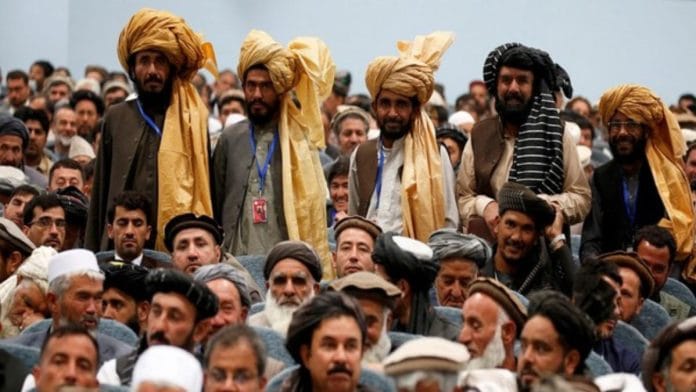New Delhi: Pakistan government’s push to revive a traditional tribal justice system in the restive region of Khyber Pakhtunkhwa has drawn fierce backlash from the civil society and political opposition. They warn the move threatens to roll back constitutional gains made since the 2018 merger of the former Federally Administered Tribal Areas with Khyber Pakhtunkhwa.
In a high-level meeting held on 2 July, federal and provincial officials met in Islamabad to discuss “alternative justice” mechanisms for the merged districts which were formerly governed under a separate set of colonial-era laws known as the Frontier Crimes Regulation (FCR). A central point of discussion: bringing back the jirga system in the merged districts of Khyber Pakhtunkhwa.
According to the government, the move will “promote an effective alternative justice system in tribal districts” and lead to “development and maintenance of law and order in merged districts.”
Jirgas, or traditional councils of male tribal elders, have long been used to resolve disputes based on customary practices rather than formal laws in tribal regions of Pakistan. Though seen by some as a grassroots mechanism for maintaining order, the system has been criticised for perpetuating gender discrimination and reinforcing local power hierarchies.
“The state’s move to revive jirga systems in the merged districts is not just alarming — it’s a blatant betrayal of the Constitution and the promises made to the people of ex-FATA during the merger,” Moniza Kakar, a human rights lawyer and Pashtun activist based in Karachi, told ThePrint over the phone.
“Jirgas have long operated outside the framework of law, enabling grave human rights abuses including honour killings, child marriages, and collective punishments. Their revival signals a dangerous return to parallel justice systems that deny individuals — especially women and vulnerable groups — their basic legal rights,” she added.
Senior journalist and analyst Zahid Hussain sees the jirga revival proposal as more than just a misguided policy move and potentially a step toward undoing the FATA merger itself.
“There may be no formal plan yet to reverse the merger, but forming a federal committee on the matter sends the wrong message and undermines the federation’s unity,” Hussain wrote in Dawn.
He said that the 2018 reforms were a vital step toward integrating a region long used as a strategic buffer zone by the US to train militants from Afghanistan in their fight against the Soviet Union, first during the Cold War, and later in the fight against militancy. While military operations have pushed back terrorist groups like the Tehrik-i-Taliban Pakistan (TTP) which were previously active in the region, the administrative vacuum and lack of development have left communities vulnerable and disillusioned.
“There certainly is something sinister about the federal government rethinking ex-Fata’s reforms and the revival of the jirga system there. By denying the region its democratic and civil rights, the state is further alienating the tribesmen. It will be disastrous if the security pretext is used…restoring the old order will only worsen matters,” Hussain said.
Social anthropologist Naveed Ahmad Shinwari, author of the book Political and Social Change in Pakistan’s Tribal Areas: Understanding Pashtun Youth, echoed the concern.
“The merger of FATA with Khyber Pakhtunkhwa in 2018, made possible through years of struggle by political parties, civil society, and young activists, was meant to bring long-overdue rights and development to the tribal belt. But progress has been painfully slow, held back by weak political will and a lack of resources,” he told ThePrint.
“Communities are still trying to navigate the unfamiliar formal justice system, a process that will take time and support. Meanwhile, the federal government’s move to revive the old jirga system has sparked unease, with many fearing it could pave the way for reversing the merger — an outcome long sought by the TTP,” he added.
Prominent human rights activist and sociologist Farzana Bari told ThePrint that Jirgas — historically male-dominated and controlled by elite, often feudal, patriarchal figures — are undemocratic, and exclude women and marginalised communities. Their judgments typically favor the powerful, not the victims, especially when those victims come from lower classes or disadvantaged backgrounds.
“In Pakistan, there’s a need for stronger, more democratic local government systems. Masalati (reconciliation) councils, if properly elected and inclusive of women and marginalised groups, can serve as fair alternatives. The reliance on Jirgas stems from limited access to formal justice, especially in remote areas. Strengthening the judicial system and ensuring access to legal justice is essential to eliminate the need for such parallel structures,” she said.
Also read: ‘My only crime is reporting truth’—Pakistan bans 27 YouTube channels over ‘anti-state content’
Constitutional overreach
The jirga system was formally abolished following the 2018 passage of the 25th Constitutional Amendment, which merged FATA with the province of Khyber Pakhtunkhwa. The move was widely hailed as a step toward mainstreaming the region and extending constitutional rights to millions of previously disenfranchised citizens.
The Khyber Pakhtunkhwa government, led by the opposition Pakistan Tehreek-e-Insaf (PTI) party, has rejected the federal initiative, accusing Islamabad of constitutional overreach.
“In none of the committee meetings was reviving the jirga system discussed for the tribal areas, and after the 18th Amendment, that right belongs to the provincial government,” PTI chairman Barrister Gohar Ali Khan said at a press conference in Islamabad last week.
PTI leaders argue that the federal government’s renewed interest in the region coincides suspiciously with the stalled KP Mines and Minerals Bill — a controversial piece of legislation that would regulate the province’s rich natural resources.
Political leaders and former lawmakers from the merged tribal districts, too, on Thursday, rejected the federal government’s move to form a committee on reviving the jirga system, calling it a step toward undoing the FATA-KP merger. Speaking at a seminar in Landi Kotal, they said the region couldn’t endure further “experimentation” over its future.
(Edited by Aamaan Alam Khan)






